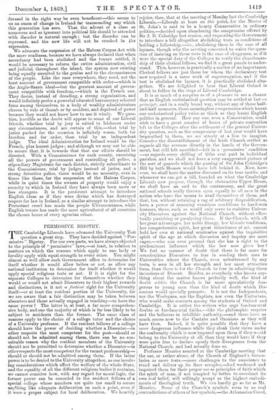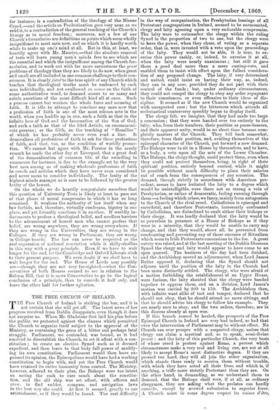PERMISSIVE BIGOTRY.
rejoice, then, that at the meeting of Monday last the Cambridge Liberals,ŌĆöLiberals at least on this point,. for the Master of St. John's is said to be a hearty Conservative in ordinary politics,--decided upon abandoning the compromise offered by Sir J. D. Coleridge last session, and requesting the Government to introduce a bill altogether abolishing tests as conditions of holding a fellowship,ŌĆöi.e., abolishing them in the case of all laymen, though why the meeting consented to waive the ques- tion of insisting on these tests in the case of clergymen, as if it were the special duty of the Colleges to verify the churchman- ship of their clerical fellows, we find it a great puzzle to under- stand. This, however, is practically a master of no importance. Clerical fellows are just those for whom the declaratory test now required is a mere work of supererogation, and if the test is abolished for laymen, it is practically abolished alto- gether, We are delighted to hear that Liberal Oxford is about to follow in the steps of Liberal Cambridge.
It is as much of a surprise as of a pleasure to see a chance that an English ecclesiastical question may be settled at last on principle, and in a really broad way, without any of those half- and-half measures, those meaningless compromises which haunt our ecclesiastical policy twice as thick as they haunt English politics in general. How any one, even a Conservative, could wish to have a great number of bones of private contention left to the Colleges after the settlement of the general Univer- sity question, such as the compromise of last year would have bequeathed to them, we are utterly at a loss to imagine. Conceive the disestablishment of the Irish Church settled as regards all the revenue directly in the hands of the Govern- ment, but still left unsettledŌĆöleft in a ' permissive' condition ŌĆöas regards every shilling of tithe rent paid in individual parishes, and we shall not have a very exaggerated picture of the sort of quarrels which the passing of Sir John Coleridge's Bill by both Houses would have left behind it. Now, how- ever, we shall have the matter discussed on its true merits, and whenever we can get a bill, founded on what the Cambridge Liberals now propose, through the obstructive Upper House, we shall have an end to the controversy, and the great national schools really thrown open equally to all men in the nation who have the means to avail themselves of them, and that, too, without retaining a rag of arbitrary disqualification, here, a power of annexing vexatious conditions to hard-won honours, there, such as would only serve to embitter Univer- sity Dissenters against the National Church, without effec- tually punishing or paralyzing them. If the Church, with all her great advantages, her noble liturgy, her historic traditions, her comprehensive spirit, her great inheritance of art, cannot hold her own at national seminaries against the inquisitive spirit of the age at which discussion and inquiry are most eager,ŌĆöwho can even pretend that she has a right to the predominant influence which the law now gives her ? We feel no manner of doubt that there is far more for conscientious Dissenters to fear in sending their sons to Universities where the Church, even unbuttressed by any tests, is seen in all her strength and her most attractive form, than there is for the Church to fear in admitting these incursions of Dissent. Besides, as everybody who knows any- thing about the matter knows perfectly well, the kind of doubt within the Church is far more speculatively dan- gerous to young men than the kind of doubt which Dis- senters would specially promote. It is not the Independents, nor the Wesleyans, nor the Baptists, nor even the Unitarians, who would make converts among the students of Oxford and Cambridge. It is rather the writers who urge 'fundamental doubts or fundamental faiths,ŌĆölike the philosophic sceptics and the believers in infallible authority,ŌĆöand these have as much access now to the Cantabs and Oxonians as they will have then. Indeed, it is quite possible that they have a more dangerous influence while they cloak their views under the conformity which is now imposed upon them if they would belong to the University at all, than they Would have if they were quite free to declare openly their divergences from the National Church, and had actually done so.
Professor Maurice asserted at the Cambridge meeting that the use, or rather abuse, of the Church of England's formu- laries as mere tests,ŌĆömere challenges to the conscience to stand and deliver up its finer scruples,ŌĆöhad weakened and impaired them for their proper use as principles of faith which the spirit of man, if not tempted by bribes to overshoot its own real belief, will willingly accept as the highest embodi- ments of theological truth. We can hardly go so far as Mr. Maurice. Some of the Church's symbols seem to us real for instance, is a contradiction of the theology of the Nicene Creed,ŌĆöand the article on Predestination goes very near, as we read it, to a contradiction of the general teaching of the Church's liturgy as to moral freedom ; moreover, not a few of our Church's formularies are definitions on points which seem wholly insignificant to most men now, and on which it is hardly worth while to make up one's mind at all. But in this, at least, we heartily agree with Mr. Maurice,ŌĆöthat the absolute removal of tests will leave young men's minds free to see which are the essential and which the insignificant among the Church for- mularies, and to work out with far more earnestness the great problems of theology than they are likely to do now, when great and small are all included in one common challenge to their con- sciences. It is clearly fatal to the true spirit of any Church which teaches that theological truths must be embraced by each man individually, and not swallowed en masse on the faith of some authoritative word, to demand assent to so many and subtle assertions of the most difficult kind all at once. Such a process cannot but weaken the whole force and meaning of faith. It is idle to attempt to convince any man now that a profession of faith is one of the most solemn acts in the world, when you huddle up in one, such a faith as that in the infinite love of God and the Incarnation of the Son of God, and such a faith as that of the 33rd Article, on excommuni- cate persons ; or the 35th, on the teaching of " Homilies " of which he has probably never even read a line. It demoralizes all professions of faith to ask for these professions of faith, and that, too, as the condition of worldly promo- tion. We cannot but agree with Mr. Forster in the manly remark he made the other day at Liverpool, that a great deal of the demoralization of common life, of the swindling in commerce for instance, is due to the example set by the very best men among us of making wholesale professions of faith in creeds and articles which they have never even considered and never mean to consider individually. The laxity of the highest minds amongst us is sure to be followed by the greater laxity of the lowest.
On the whole, we do heartily congratulate ourselves that this question of University Tests is likely at least to pass out of that phase of moral compromise in which it has so long remained. It weakens the authority of law itself when any law forbids, and, therefore, virtually condemns, bigotry in one place, and yet formally sanctions it in another. If worldly in- ducements to profess a theological belief, and needless barriers to the advancement of honest men who cannot profess that belief, are wrong anywhere, they are wrong everywhere. If they are wrong in the Universities, they are wrong in the Colleges. If they are wrong in Parliament, they are wrong in College boards. The law can never be respected as the real expression of national conviction while it shilly-shallies in this way with a great principle. Even if we have to wait longer for the end, let the Cambridge and Oxford Liberals stick to their present purpose. We even doubt if we shall have to wait longer for the end. The House of Lords may possibly seeŌĆöthough they are not very far-sightedŌĆöwhat the Con- servatives of both Houses seemed to see in relation to the Reform Bill, that it is more Conservative to go to the logical conclusion of a principle, than to concede it half only, and leave the other half for further agitation.



































 Previous page
Previous page